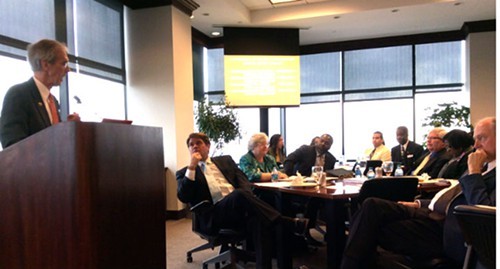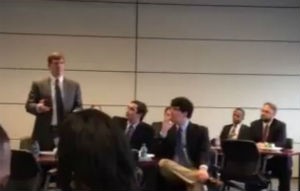
- JB
- Judge Childers addressing Shelby County legislators on Wednesday
NASHVILLE — A trial of sorts is about to pit a Shelby County legislator against a goodly portion of the county’s judicial establishment. Only this showdown will take place not in the courtroom but in the hearing rooms and chambers of the Tennessee General Assembly.
What’s at stake, if legislation introduced this week by state Senator Brian Kelsey (R-Germantown) makes it through in the current legislative session, is the possible loss of two Shelby County judgeships, and a number of the county’s judges and lawyers turned up in the state capital this week to voice their displeasure at the prospect.
Kelsey’s measure Senate Bill 1484, which so far lacks a House co-sponsor, would, in the language of the bill, “abolish… Parts I and V of the circuit court of the 30th judicial district effective September 1, 2014 and provides that no person will be elected at August 2014 (Shelby County) general election to serve as judge of the abolished parts.”
Divisions I and V of Circuit Court have been filled, respectively, by Judge John McCarroll, who is retiring, and Judge Kay Robilio, whose retirement is already effective. Kelsey cited this fact as the reason for those divisions being singled out for elimination. As for what he perceives as the need for eliminating positions at all, he cited a study prepared last fall by state Comptroller Justin Wilson, which was dispatched to members of the General Assembly, including Kelsey, who serves as chairman of the state Senate Judiciary Committee.
Entitled “Tennessee Trial Courts Judicial Weighted Caseload Study,” the document , prepared for the state by the National Center for State Courts as the result of a legislative mandate, is thick with statistics and evaluations of trial frequencies, judges’ workloads, and extrapolated caseload data of other kinds. The bottom line: The state’s 30th Judicial District (Shelby County), which has 9 Circuit Court judges, and three Chancery Court Judges, has an excess of presiding civil jurists — 2.76 too many, in fact.
Led by Shelby County’s senior Circuit Court judge, W.A. “Butch” Childers, a sizeable contingent from the county’s legal community, including other judges and lawyers, were in the environs of Capitol Hill and Legislative Plaza Wednesday,
“We are concerned,” Childers said, to a luncheon meeting of the Shelby County legislative delegation, held in an office building across the street from Legislative Plaza. He noted that the last time Shelby County was granted the right to add a new civil judge was 1984 and said, “It’s very difficult to get a new judge even when you need a new judge. Once you lose a judge it is extremely difficult to get a new judge.”
He presented a series of slides, one of which noted the ratio of active civil judges to population in various Tennessee counties. Shelby County had a ratio of one civil judge for every 77,000 citizens — that latter number being conspicuously higher than in the state’s other major urban areas.
As Childers noted, the legislature ceased taking pure population numbers into effect some years ago — a fact that one of the delegation attendees, state Senator Jim Kyle, remembered as being due to the fact that in counties like Shelby, pure population figures did not take into account the additional number of commuting citizens from adjoining areas, whose presence accounted for a greater likelihood of medical, damage-related, and other cases to be tried in county courts.
Childers noted such factors as the higher incidence of poverty-line residents in Shelby County, a fact resulting in disproportionate number of “pro se” (self-filed) litigation; a huge backlog of untried cases of all kinds, and a larger rate of medical malpractice cases to be tried, even as the number of malpractice filings may have dropped following legislation imposing caps on damages.
The impact of malpractice legislation had been mainly on the type of case that in the past had been subject to summary dismissal, Childers said. “Meritorious” suits were, if anything, requiring more trial time. The weighted caseload study also failed to take into account factors like retrials, repeated appeals, hung juries, and the like, he said.
Childers was supported in his assertions by Memphis lawyers Les Jones, David Cook, and Tim Smith. In what he called “a statement against interest,” Smith attested to the fact of a large and growing case backlog which would worsen if the county lost two judges and said, “If you take away two judges in Shelby County., you might as well call it the lawyer-enrichment act.with small businesses having to pay the tab. This will cause your businesses in your district more money, and this will result in more money for lawyers.”
Circuit Court judges Donna Fields and Karen Williams also made an effort the debunk the idea that Shelby County caseloads required fewer judges than at present. “Why isn’t my docket getting shorter?: asked Williams. She said that, since 2008, the number of cases to be tried in Shelby County had risen in all but one year. A former legislator herself, she called for the Shelby delegation “to speak with one voice” against the proposed legislation.

- JB
- Kelsey responding to questionsls
Addressing his question to “the Senate Judiciary chair” (Kelsey), state Rep. G.A. Hardaway asked, “will this bill come to your committee, sir? Are you the reason they (the visiting lawyers and judges) are up here?”
Kelsey had said during the discussion that he he acted on the assumption that, as the weighted caseload study seemed to suggest, case filings in Shelby County had dropped. In an interview after the meeting, he elaborated as follows:
“As the Republican Party, we are the party of small government. If we’re not willing to start by following up on the studies that we’ve funded, where are we going to start? This is my responsibility as chairman of the committee, to make difficult decisions, and sometimes the best decisions for the entire state of Tennessee may be the most difficult to make as a committee chairman, but that’s what we’re sent here to do — to look out for what makes Tennessee a better state and what takes care of our taxpayers and insurors.”